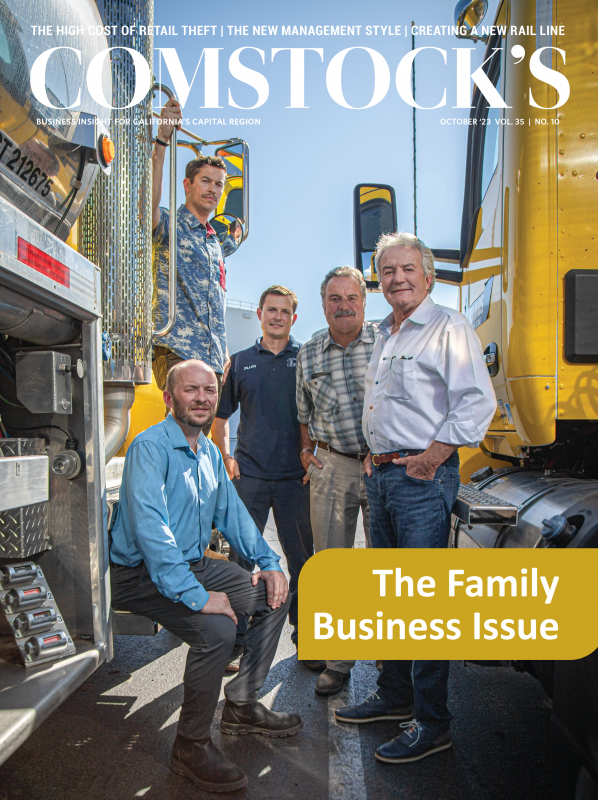The line from “The Godfather,” “It’s not personal, it’s strictly business,” does not apply to the members of a family business. For us, there are a wide range of emotions that start at an early age as we realize that we are part of something that consumes our parents’ time, including conversations at dinner and the holidays. These emotions continue into adulthood and certainly drive many decisions regarding our futures.
But the one emotion that stays with us whether we join the family business or choose another profession is pride and the desire to see the family business prosper into the next generation.
How does pride drive operating a family business? That depends on your generation. For the founding generation, your heart and soul goes into building a business that you hope will stand the test of time and attract the next generation to participate in keeping it going. For the next generation, you want to make the previous generation proud of your decisions and the direction you take the business. But you also seek to create the opportunity and atmosphere to entice the next generation to join the business.
My family is part of a multi-family business that sells and services tractors as a primary line. My grandkids don’t ask if Grandpa or Mom or Dad are at work; they ask if they are at the “tractor farm.” Those thoughts are cute and make us want to work even harder to cultivate a business that they will have the opportunity to operate someday.
What traits make up a successful family business? Family Business magazine’s editor-in-chief Amy Cosper recently identified five traits that I think are core parts of every successful family business:
Stability. We generally adopt a long-term perspective, focusing on legacy and generational continuity.
Authenticity. We thrive on personal relationships and genuine connections. Most of us are unapologetic and crystal clear about what we stand for.
Values. We are guided by core values and principles established by founders and embraced by generations and branches of a family tree.
Employee focus. We prioritize employees’ well-being and consider them a part of our extended family.
Community. We have deep-rooted connections within our local communities.
To be successful, we need advisors who can provide clear-eyed advice to family members about how best to maximize the value of their share of the family business. Unfortunately, this also often includes recommending if we would be better off financially by selling the business and moving out of California.
In many cases we would be. But what our advisors often do not recognize is that the emotional attachment to seeing the family business prosper and be passed on to the next generation is stronger than the desire to just make money and move on.
In our region, there are two organizations that really understand the emotions of being part of a family business. One is the Family Business Association of California, the only organization solely representing the interests of family businesses at our Capitol. As FBA’s chairman, I often meet with legislators, many of whom will fondly comment about coming from a family business even as they enact new laws and regulations that make it more difficult for their family to run their business. I imagine that must make for some interesting conversations at their family gatherings.
Another is the Capital Region Family Business Center, a nonprofit run by family businesses trying to figure out how to perpetuate their business to the next generation. Both organizations have clear missions, and I encourage all family businesses in our region to strongly consider joining them.
There is a lot of talk today about the purpose of business. The classic viewpoint is that it’s to maximize the return on investment for the shareholders. But others argue that businesses must expand their purpose to include multiple stakeholders — not just shareholders but also employees and their community.
The funny thing is, family businesses have been doing both for ages. The only way to perpetuate a family business is to make decisions that make sense for the long term. The business must be profitable and beneficial to the shareholders today, but it can’t just satisfy the stock market or a private equity partnership in the short term. The same logic applies to taking care of employees, customers and the communities that we serve. We must create an environment that allows for long-term success in all those areas.
Family businesses are the rock of our state’s economy and its communities. FBA will continue doing everything we can to educate our officials that they need to keep that in mind when devising new laws and regulations that, when you add them up, make owning a successful family business more and more difficult.
A wide range of emotions run deep within family businesses, from the anxiety about keeping it running to the simple pride of being part of a history. But in the end, it is worth every drop of emotion to create a future that benefits so many.
Ken Monroe is the president of Holt of California, a family-owned business since 1931 and a Caterpillar dealer for 16 counties, from Yuba City to Merced. He is also chairman of the Family Business Association of California.
Stay up to date on business in the Capital Region: Subscribe to the Comstock’s newsletter today.
Recommended For You

Owning the Narrative
How to take initiative and solve problems before they reach your supervisor
There is nothing more rewarding than creating and implementing a plan to fix a broken process — before being asked to do so. It changes everything because the leader is using her creative fuel instead of being told what to do. Instead of being asked to fix a broken process, the leader self-evaluates her operation and addresses broken processes of her own volition.

The Anti-work Trend Is Growing Among Young Professionals. Is Love the Answer?
The anti-work movement has been growing for a few years, with Reddit’s Antiwork sub hosting 3 million users today. We’ve also seen anti-work crop up in many of the major work themes of the last 2-3 years, including …

The Future of Work
New spaces. New thoughts. New ways to work.
After 16 years in the same office space, and just six months before our lease came up for renewal, my senior VP turned to me and said, “Now that the pandemic is behind us, what do you think about moving to a new office?”

How to Transition From a Large Firm to a Small One
You might lose some perks, but you gain personal control
The pandemic saw millions of workers rethinking their jobs and wanting to strike out on their own. The Census Bureau reported 5.4 million applications to start a new business in 2021. And most U.S. business owners started their own business. There are many reasons to leave a big firm and start a smaller firm, and my experience fell into the most common reason — I wanted more control.

How to Communicate With Your Audience During a Crisis
Responding with empathy, action and clarity
In times of crisis, CEOs, business owners, government officials
and other public figures have a responsibility to effectively
convey important — and sometimes life-saving — information to the
public. Understanding how best to deliver that information could
make or break your reputation and your organization.




